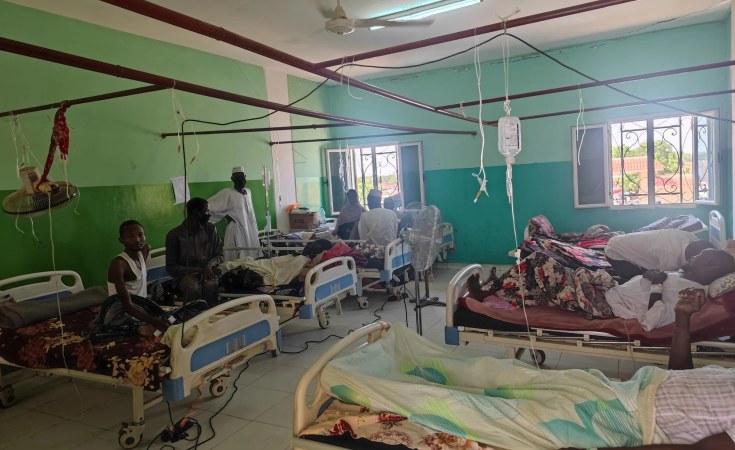Since 10 May, El Fasher, in North Darfur state, Sudan, has seen intense fighting between the Sudanese Armed Forces (SAF) and Joint Forces and the Rapid Support Forces (RSF). As the conflict continues to ravage El Fasher, the city's hospitals have been damaged and shut down. Meanwhile, thousands of people are fleeing in search of safety, with many arriving at Zamzam camp, where there is already an acute malnutrition crisis. Teams from Médecins Sans Frontières (MSF) are adapting their response to maintain provision of medical assistance as needs escalate and access to care diminishes.
Of the three main hospitals in El Fasher, only Saudi hospital remains operational today. The Babiker Nahar paediatric hospital was damaged on 11 May, when an airstrike carried out by the SAF landed 50 metres away. Since 24 May, South hospital was hit by mortars and bullets multiple times, killing two people and wounding 14, and leading MSF and the Ministry of Health to evacuate patients. On 8 June, the South hospital was completely shut down after being stormed and looted by the RSF who fired shots inside the facility.
"Fortunately, most patients had already been evacuated from South hospital before the RSF raid, and the remaining patients and staff were able to escape," says Michel-Olivier Lacharité, MSF head of emergencies. "But the fact remains that hospitals have not been spared by anyone."
"Now, only Saudi Hospital, has surgical capacity for the whole of El Fasher, and we fear for its safety and for the people needing care," says Lacharité. "It's the responsibility of the warring parties to spare medical facilities and respect their protected status."
MSF is supporting Saudi hospital, where wounded are now arriving. Originally a maternity hospital, the facility needs to be adapted to be able to manage wounded and mass casualties, while continuing to provide care for women and newborns. For several days, the Saudi hospital lacked sufficient electricity to perform surgeries, but MSF teams helped to restore the energy supply. We are also helping to organise the emergency room and are evaluating needs for medical supplies and materials. From 10 May to 11 June, a total of 1,418 wounded arrived at South hospital and subsequently at Saudi hospital; 226 people died.
"We are doing our best to provide support but the situation in El Fasher is chaotic," says Lacharité. "The entire city is unsafe, and communication is often down, making it extremely difficult to move around, evaluate needs, and organise supplies and support."
"Our staff has also been displaced by the fighting, and some colleagues have lost their houses too in the shelling, so everyone is trying to cope," says Lacharité.
We are relocating our maternal and newborn care services from South hospital to the MSF field hospital in Zamzam camp, 15 kilometres outside the city. Even before the closure of South hospital, fewer and fewer women were able to come to the hospital due to heavy fighting in the area.
People are also fleeing different parts of the city in search of safety, and MSF teams have seen people arriving in Zamzam and beyond, to areas such as Sortoni and Rokero in Jebel Marra.
"Our teams have seen streams of people on the road, fleeing parts of the city and coming towards Zamzam," says Lacharité. "We don't have a clear estimate yet of how many people have left El Fasher, but it appears that tens of thousands have been leaving, heading towards Zamzam."
In Zamzam camp for displaced people, where an estimated 300,000 already resided, MSF has been responding to a catastrophic malnutrition crisis, providing care through two clinics and a field hospital. Nutrition surveys carried out in January, and again in March and April, revealed malnutrition rates were double the emergency threshold amongst children, with similar findings among pregnant and breastfeeding women, signalling a massive, life-threatening crisis in Zamzam camp.
"In the current chaos created by the conflict, we are not able to re-evaluate the nutrition rates in the camp, assess new needs, or determine the number of new people arriving," says Lacharité. "The conflict has impacted our teams; some have evacuated and are working remotely, while many of those remaining have also been displaced. They are doing everything they can to keep activities running and open the new maternity ward, while ensuring their own safety and needs."
"This situation makes it very difficult to obtain updated information, but given the prior malnutrition rates, the increased displacement of people, and the new difficulties created by heavy fighting in accessing food due to security concerns and market disruptions, the situation is likely to be alarming. A massive scaled-up response is surely needed," concludes Lacharité.


